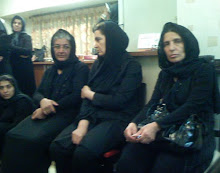
Several mothers who lost a family member during the post-election events have issued a warning statement about the traumatic effects of physical and psychological torture of political prisoners. “The life and health of prisoners continue to be endangered after release,” the Laleh Park Mourning Mothers expressed. The Mourning Mothers statement refered to several cases in which prisoners faced very serious psychological and physical consequences after release from prison. The statement warned families to take consequences of prison torture seriously in order to facilitate the released prisoners’ healing process.
The 28 August 2010 statement describes the effects of psychological and physical torture on four political prisoners. “Hessam Tarmasi, who is a 19-year-old young man who spent one year in prison, has been hospitalized for kidney disease and severe depression. Narges Mohammadi, the Spokesperson for Center for the Defense of Human Rights and mother of two three-year-old toddlers must be re-hospitalized following the deterioration of her psychological and physical condition after release from prison. Mahboubeh Karami, a women’s rights activist has had to be hospitalized due to physical conditions caused by inactivity inside prison and severe depression. Hamzeh Karami, a former IRGC Commander has been hospitalized in an Intensive Care Unit due to physical and psychological torture at Evin Prison,” said the statement.
“As most released prisoners have faced different illnesses due to psychological, mental, physical, and sexual torture, some of which have led to death, the Laleh Park Mourning Mothers feel obligated to warn families of prisoners about the regrettable cases which have happened so far, so that they can strive to restore the health of the released prisoners, especially young people who do not have enough experience about the dangers and effects of torture,” the statement added.
“During the first days after a loved one’s release, seriously pursue complete tests and medical monitoring on all organs, especially kidneys, brain, and nervous system, so that the extremely bitter experience of the Kahrizak tragedy and similar cases will not be repeated. Ahmad Nejati Kargar, 22, slipped into a coma three days after his release due to kidney failure and died,” the Mourning Mothers warned the families.
The statement emphasized that the mentioned examples are only a part of what is happening inside Iranian prisons. “While according to the Islamic Republic of Iran’s laws, torture is illegal and a prisoner has legal rights, sometimes a prisoner has to go on a hunger strike to demand his minimum legal rights. As witnessed, 17 of the best Iranians endured a prolonged hunger strike [at Evin Prison] in order to demand their most basic rights and we remain concerned about the consequences of this hunger strike and our loved ones’ health.”
“History has shown that such lack of compassion and injustice will not go unanswered. But as mothers and family members of prisoners, we must pay sufficient attention to the health of our loved ones and not lose any time, striving to help our children gain their relative health, knowing that the effects of torture will never completely disappear,” the statement concludes.








No comments:
Post a Comment